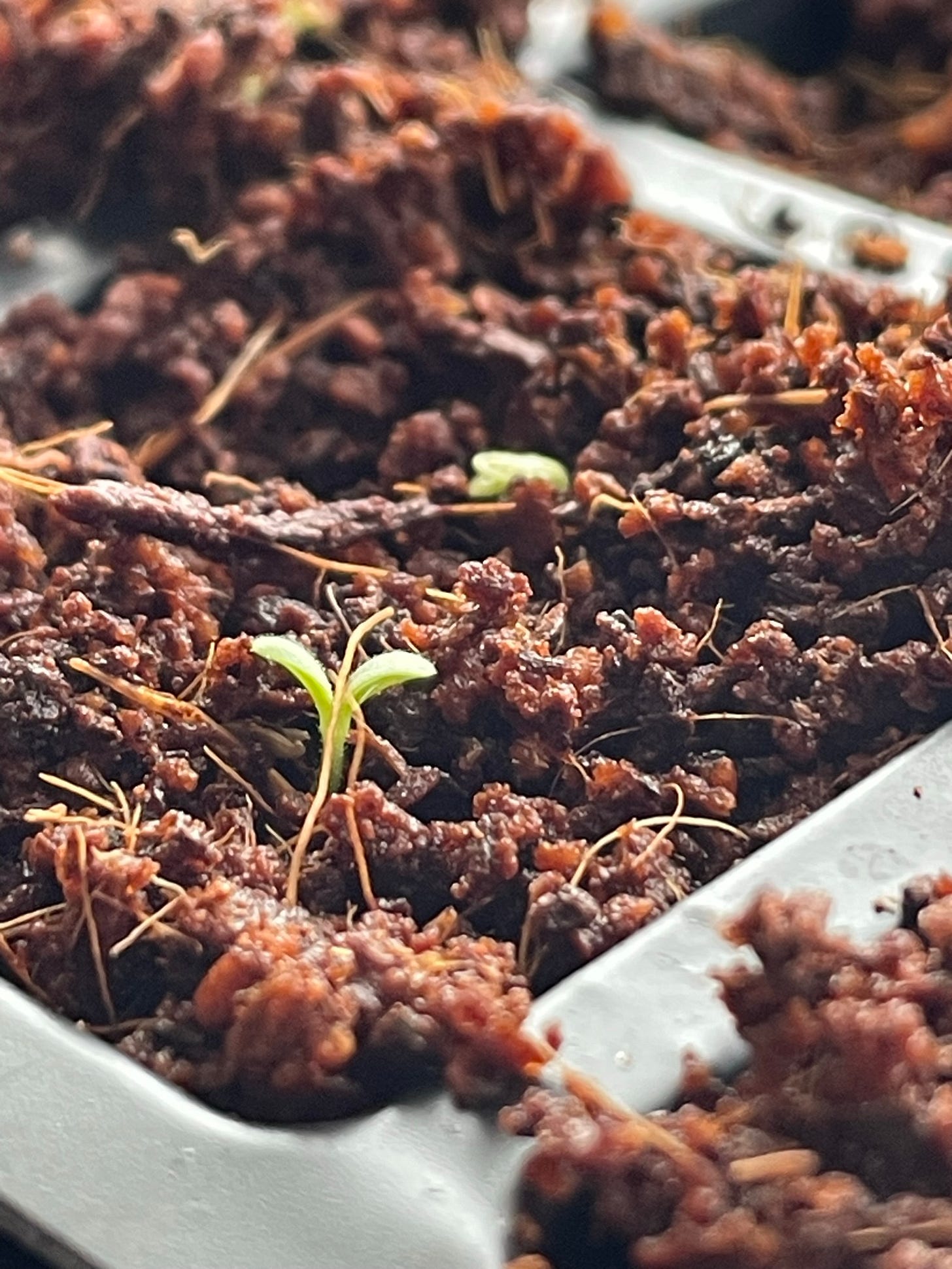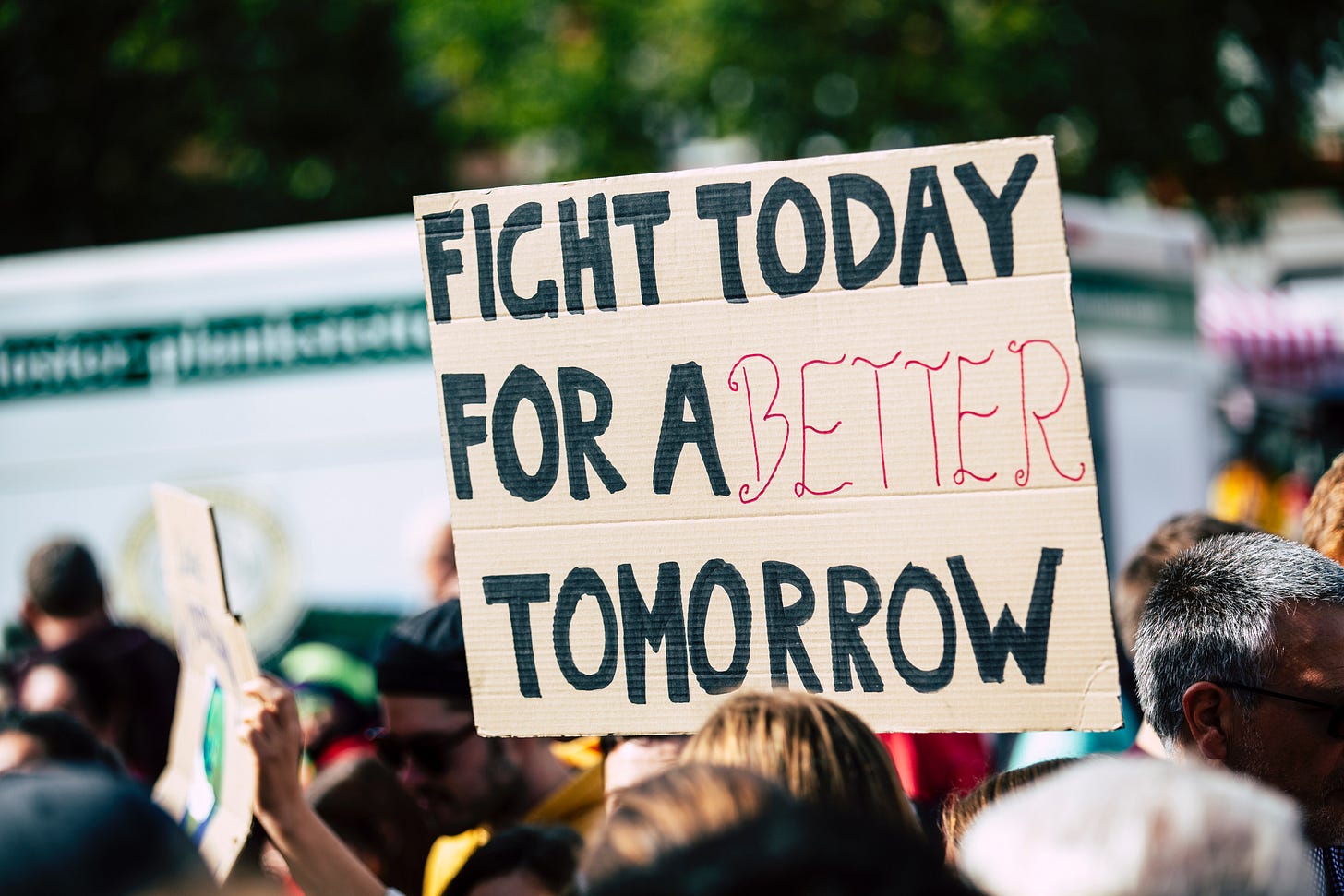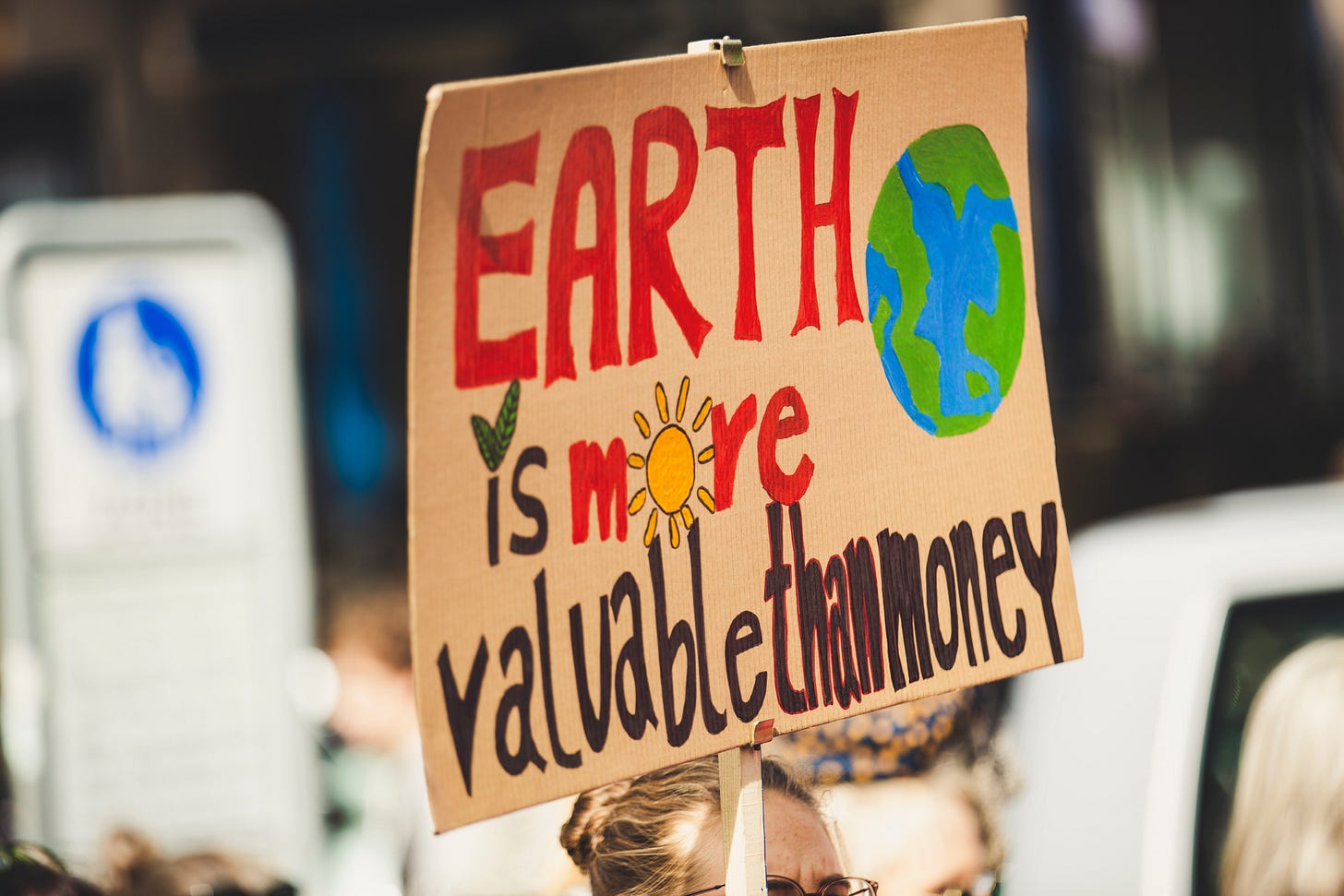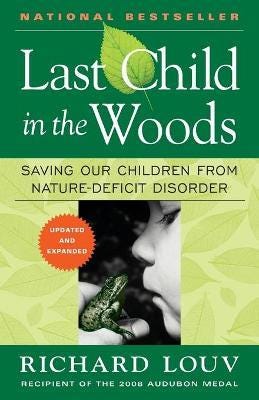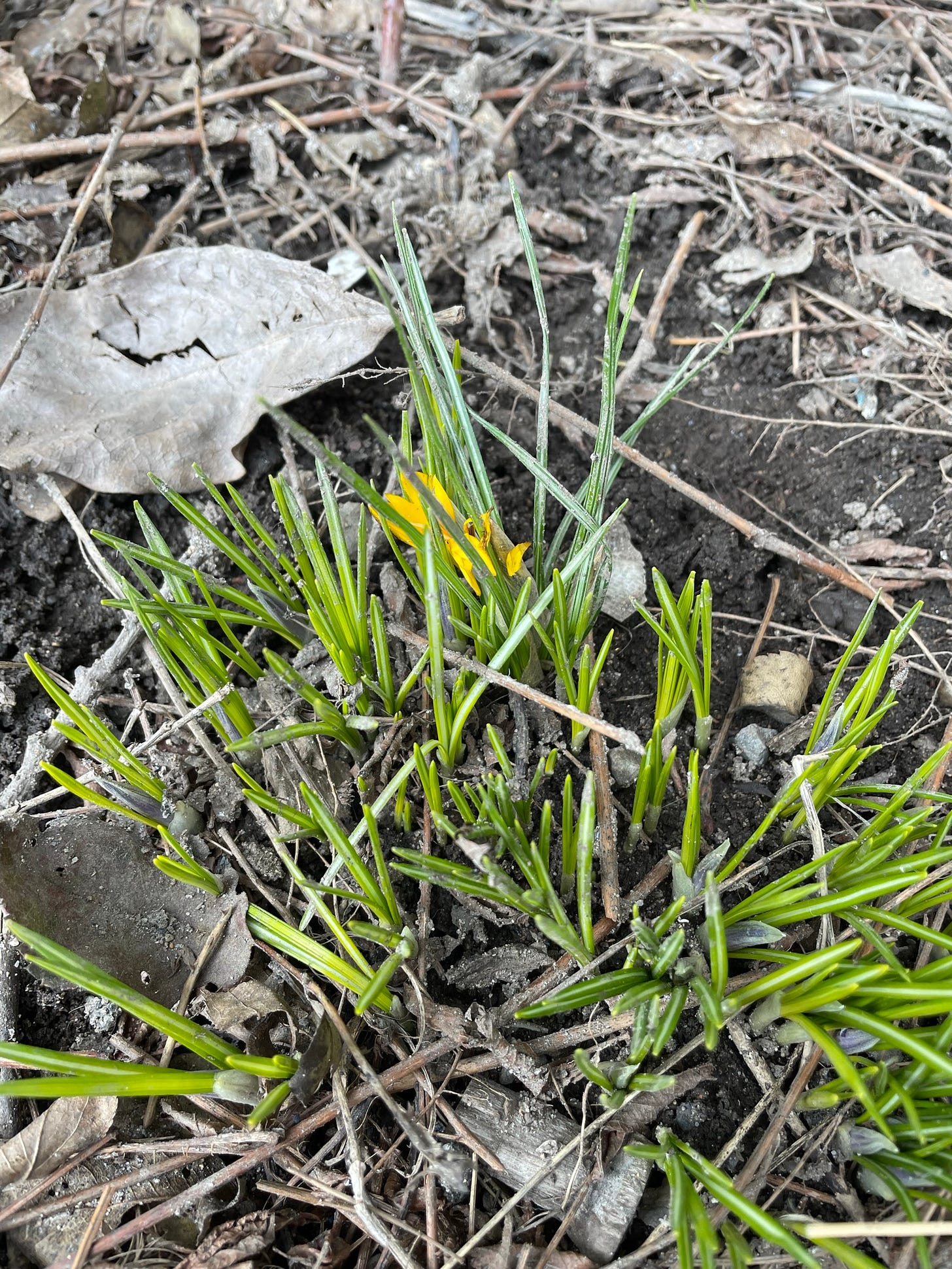What Do You Do with Your Fear of Climate Change?
Reflecting on the questions, "How do we invest our lives?" and "If you thought the world was going to send soon, how would you live?"
On the weekend, I planted some tomato and pepper seeds, as well as squash and lettuce greens, to begin my spring garden. I have never grown tomatoes or peppers from the seed, nor even lettuce. I consider myself a beginner gardener, because even though I have had a vegetable garden on and off over the years, I have never been particularly good at it.
What prompted me to start seeds indoors is the felt desire to more seriously focus on growing food for my family, and as I learn more about how to do so, teach my children to grow food, too. My husband Mark and I talk often about being prepared for emergencies; we have food and supplies stocked in the basement. We have gas and charcoal BBQs to cook food, and wood for the fireplace, should we lose power. We have bottles of water, and water filters to filter the pool water or snow. We think that we are modestly prepared for a power outage or other situation should a storm or other emergency affect our home or neighbourhood.
Yet the cost of food is rising, and the climate crisis is worsening every day. While I live in an area that is, so far, relatively sheltered from the worst effects at the moment (is this why we can’t get a groundswell of people at protests in Ottawa? Because it doesn’t seem real when our houses aren’t threatened by forest fires or mass flooding?), global heating is rising. As we already know, and yesterday’s IPCC synthesis report makes clear, without immediate action to halt fossil fuel emissions, the heating is only going to worse, and we are headed for disastrous consequences for people and the planet.
This terrifies me; it raises my anxiety levels; sometimes, I feel overwhelmed and helpless at the magnitude of the changes that need to happen to mitigate global heating and prevent catastrophe around the world.
On Saturday morning, I was sitting in the living room, drinking coffee and looking out over the snow-covered garden. I was thinking of our emergency preparedness, and then realized: there is more that I can be doing, now, to act. There is more that I can be doing, now, to help my family and I in the face of the climate crisis. There is preparedness of a different sort that I can take on, that can be effective.
I can begin my garden, and invest more time and effort into it than I have in the past. I can learn, and then teach my children, how to grow as much food as possible in our city garden, and how to preserve it.
This realization immediately motivated me, and so I got ready for the day, headed out to buy seed, came back, and started my tomatoes and peppers. Once I did so, I started to feel better. My fear and anxiety about the climate crisis didn’t go away, but I was able to get some distance and perspective. By planning and starting my gardening, I have found a way to cope with my fear and anxiety, channeling them into a constructive, productive activity. And, in doing so, I am actually taking action in response to the climate crisis. As food prices continue to rise due to global food markets being negatively impacted by weather-related disasters and their fallout, I am taking direct steps to put food on the table. As the world continues to change, and will most definitely be a different world for my children than it is for me, I am taking action to give them skills that can be useful in the future, no matter what that future holds.
So, by starting my garden, I have found a way to both cope with and respond to the climate crisis.
There is so much that needs to be done, of course. Without political action – all of us need to get out into our elected officials’ offices, in the courts, and on the streets to demand immediate effective action from governments and industry – we won’t move the needle on global heating. But each one of us needs the kinds of individual and social activities that are effective both for helping us cope, and taking action on individual levels, too.
When I went to church this past Sunday (March 19), all of these ideas were swirling around in my head. The minister, Rev. Paul Dillman, was preaching on a challenging text in the Gospel of Matthew, the parable of the talents. Here is that parable:
14 ‘For it is as if a man, going on a journey, summoned his slaves and entrusted his property to them; 15 to one he gave five talents, to another two, to another one, to each according to his ability. Then he went away. 16 The one who had received the five talents went off at once and traded with them, and made five more talents. 17 In the same way, the one who had the two talents made two more talents. 18 But the one who had received the one talent went off and dug a hole in the ground and hid his master’s money. 19 After a long time the master of those slaves came and settled accounts with them. 20 Then the one who had received the five talents came forward, bringing five more talents, saying, “Master, you handed over to me five talents; see, I have made five more talents.” 21 His master said to him, “Well done, good and trustworthy slave; you have been trustworthy in a few things, I will put you in charge of many things; enter into the joy of your master.” 22 And the one with the two talents also came forward, saying, “Master, you handed over to me two talents; see, I have made two more talents.” 23 His master said to him, “Well done, good and trustworthy slave; you have been trustworthy in a few things, I will put you in charge of many things; enter into the joy of your master.” 24 Then the one who had received the one talent also came forward, saying, “Master, I knew that you were a harsh man, reaping where you did not sow, and gathering where you did not scatter seed; 25 so I was afraid, and I went and hid your talent in the ground. Here you have what is yours.” 26 But his master replied, “You wicked and lazy slave! You knew, did you, that I reap where I did not sow, and gather where I did not scatter? 27 Then you ought to have invested my money with the bankers, and on my return I would have received what was my own with interest. 28 So take the talent from him, and give it to the one with the ten talents. 29 For to all those who have, more will be given, and they will have an abundance; but from those who have nothing, even what they have will be taken away. 30 As for this worthless slave, throw him into the outer darkness, where there will be weeping and gnashing of teeth.” (Matthew 25:14-30, NRSV)
In this parable, which is a metaphor for understanding the relationship between God and God’s people, the third slave, out of fear of his master, has buried the money he was given, and so did nothing with the money. For this, he is sharply reprimanded, and thrown “into the outer darkness, where there will be weeping and gnashing of teeth” (Matt. 25:30).
In his sermon on this text, Rev. Paul asks a few compelling questions. One is this: “How do we invest our lives?”1 What do we do with the lives that we are given? Do we take risks and action, and see what will come of them? Or do we hide away, doing as little as possible, so as not to be noticed, so as not to make the wrong choice?
In his sermon, Rev. Paul shared the context in which this parable is told in the Gospel of Matthew, which is helpful for understanding this question, as well as for giving us greater comprehension and compassion for the writer of this story. The writer of Matthew is waiting for the end of the world; it was believed, among Jesus’ followers, that the end was coming very soon. And so, Rev. Paul also asks: “If you thought the world was going to end soon, how would you live?”
It is this second question that has haunted me since Sunday. It is this second question, alongside the first one of how we invest our lives, that seems particularly pertinent to us today, in light of the climate crisis.
If you thought the world was going to end soon, how would you live?
In many ways, the world is ending, or at least it will be for human beings, if we don’t clean up our act with respect to fossil fuels. At the rate we are going, the human species will become extinct in a few hundred years.
If you thought the world was going to end soon, how would you live?
The world doesn’t have to end this way, for us. We don’t have to end up causing such catastrophic changes to weather patterns, the warming of the oceans, the melting of sea ice, that leads to whole areas of land becoming permanently submerged, billions of people being displaced and dying, climate-related wars over land and food increasing. It doesn’t have to be this way.
It is intense; the reality of climate change is causing widespread fear and anxiety, hopelessness and overwhelm. For marginalized communities in both the global North and South, the reality is already causing starvation, homelessness, forced migration, climate-related war and conflicts, illness and violence.
If you thought the world was going to end soon, how would you live?
This question is perfectly placed right now. How would you live? How are you living? Are you like the first two slaves, taking risks with what you have, investing your lives for hope and love, for justice for the planet, its people and animals? Or, are you like the third slave, paralyzed with fear, unable to move forward, too scared to act?
Rev. Paul pointed out that the outer darkness, with wailing and gnashing of teeth, in this parable, is not hell, as conventionally imagined. It is, instead, our world as it is today; the fear and the pain so many of us are experiencing. He relates it to the personal and social suffering many of us are living with. It is also the world of the climate crisis. When we fail to act, paralyzed by fear, then indeed, the outer darkness is terrifying and filled with suffering. Earth and its peoples are wailing and gnashing their teeth.
But when we act, despite our fear, when we invest our lives in climate action, then a number of things happen. The rate of global heating begins to move downward, and concrete change becomes manifest. We see our investments of time and effort multiplied, as others become inspired and empowered, and begin to act too. We begin to feel empowered and hopeful, more so than fearful or anxious.
When we act, despite our fear, when we invest our lives in climate action, then we also discover that there is less wailing and gnashing of teeth, as people and Earth experience less suffering; and that the end of the world is no longer coming soon. When we act, we extend the lives of our loved ones, the marginalized and vulnerable, and future human communities to come.
What this gripping, difficult parable has to say is that we need to act, regardless of our fear. We need to take risks, even as we are scared. We need to invest our lives in climate actions of hope and love. It is there, in those actions, that God meets us. It is there, in those actions, where the Kingdom of God, the whole community of life, is witnessed. It is there, in our climate actions, that we can assist in the building of the abundant life that God has promised to all.
For me, starting my garden, along with my writing and my political activism, are ways that I am investing my life, taking action despite my fear. How are you investing your life? How are you taking action, despite your fear?
Reading for Transformation
Last Child in the Woods: Saving Our Children from Nature-Deficit Disorder by Richard Louv (Chapel Hill: Algonquin Books of Chapel Hill, 2008)
The last chapter of my dissertation explores the potential for ecological literacy, a form of environmental education, to help engender radical Christian action in response to the ecological crisis. In the course of my research, I came across this book. I was reminded of it when a quote by the author showed up in my Instagram feed last week. Richard Louv coins the term ‘nature-deficit disorder,’ not as a statistical diagnosis, but as a metaphor to describe the negative effects that happen to children when they lose the daily, close interactions within the non-human world that you and I often took for granted when we were growing up. This is an excellent book about the need to bring ‘nature’ back into the lives of children, and indeed all of us.
A New Climate for Christology: Kenosis, Climate Change, and Befriending Nature by Sallie McFague (Minneapolis: Fortress Press, 2021).
I am a Sallie McFague scholar, having written a dissertation that examines the entire corpus of her work, at least at the time of submission (she wrote 3 books after then!). McFague, who died in 2019, was a renowned ecotheologian who never stopped exploring the relationship between humans, the ecological crisis, and God. I just discovered this book last week, not expecting that she had written something close to the time of her death. This is McFague’s third book engaging theologically with the climate crisis. In it, she continues her exploration of the idea of kenosis, which means self-emptying for the other, that she began in Blessed are the Consumers: Climate Change and the Practice of Restraint (Fortress Press, 2013). McFague writes in a very clear way that makes her work accessible to lay readers. I am excited to read these last thoughts of McFague, someone I was privileged to meet and share my thesis proposal with, many years ago.
Earth Community in Pictures
Spring is here, even if the ground is covered in snow where you are! Here is a picture of the first crocuses to bloom in my garden, yesterday on the Spring Equinox. When I took my daughter to school and got back around 9:30 am, they were not open. When I went out at 12:30 for my after-lunch walk, there they were! How delightful and full of wonder.
I would love to share photos here of the Earth community waking up and blooming where you are. Please email them to me at: jessica@jessicahetherington.ca.
Happy Spring!
Paul Dillman, “‘Tough Teachings Today’ #4 - Don’t Be Afraid,” preached on March 19, 2023 at Riverside United Church, Ottawa ON. http://riversideunitedottawa.ca/sermons/. Accessed March 21, 2023.





